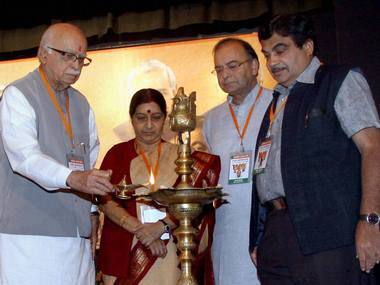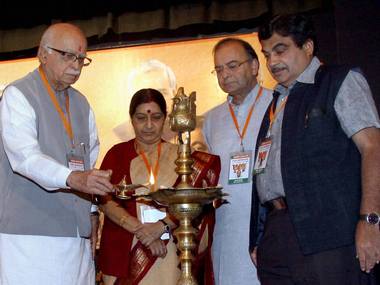It’s time. We have to ask the questions and get the answers, simply because we cannot evade it any further. The country needs its national parties. They are crucial to anchoring coalitions and giving direction to national policies. They are crucial for the political and economic stability of the country. In that sense, both the BJP and the Congress have a big role to play. In a way it is good that they represent different ideologies. The difference offers perspective to debates of national import and throws up compromise solutions. However, it’s absolutely necessary for the parties to be unambiguous about where they stand, not only on individual issues, but also on their own character and structure. We know for sure that the Congress revolves around the Gandhis, its economic policies tend to be populist, it does not want leadership in the states to stand up to challenge to the central leadership, it is professes to be secular in its approach - some would call it pseudo-secular, but that’s another issue - and in foreign affairs it is more dovish than hawkish. The party has been in power long, so it has been exposed to scrutiny and harsh criticism more than other parties. [caption id=“attachment_597707” align=“alignleft” width=“380”]
 Is the BJP a united party or divided by the RSS? PTI[/caption] But what about the BJP? It has been around in politics for decades now and in power for six years. Yes, it also provided one of the best governments the country ever had. It has many capable leaders, particularly in the states. However, is there any singular feature that marks the party apart? Does it follow any ideological line of thinking or it just survives on opposing the Congress? It’s time the BJP came clean about itself. It’s in the party’s interest to do so. So here are the questions: 1) Is it in any way connected to the RSS? 2) If it is, then does it subscribe to the worldview of the RSS? 3) Does it stand entirely by the position of the RSS on different issues? 4) If the answer is no, then is it in a position to challenge the Sangh’s position on important matters? 5) Is it true that the answer is yes, would it admit it without inhibition? Would it make it clear that its stand on the status of women in the society, education, etc. is the same as that of the RSS? 6) Is it a nationalist party or a Hindu nationalist party? 7) In either case what is its official approach to the Muslims and the Christians in the country? The question arises because the party’s approach to the minorities so far has been to oppose whatever the so-called secular parties come up with for the minority communities; its own plan of action or independent thought on the issue has been conspicuous by its lack of visibility. 8) Is it true that the RSS has the final say on the election of the BJP president? 9) Does the party have complete freedom in this regard or with regard to policies it wants to pursue? 10) What is its policy on Pakistan? Talking about ‘strong’ action is alright but would the BJP please spell out what ‘strong’ action means? “Ten Pakistani heads for one of an Indian” is the way senior party leader Sushma Swaraj would go. Is there a contradiction between her approach and that of Atal Behari Vajpayee? Where does the party stand? Indeed, there are many more questions about the party which the BJP must answer. The exercise would clear its self-doubts and leave it more sure-footed. It would help the party emerge stronger and better. The bottom line is India needs its national parties and at least one strong alternative to the Congress.
Is the BJP a united party or divided by the RSS? PTI[/caption] But what about the BJP? It has been around in politics for decades now and in power for six years. Yes, it also provided one of the best governments the country ever had. It has many capable leaders, particularly in the states. However, is there any singular feature that marks the party apart? Does it follow any ideological line of thinking or it just survives on opposing the Congress? It’s time the BJP came clean about itself. It’s in the party’s interest to do so. So here are the questions: 1) Is it in any way connected to the RSS? 2) If it is, then does it subscribe to the worldview of the RSS? 3) Does it stand entirely by the position of the RSS on different issues? 4) If the answer is no, then is it in a position to challenge the Sangh’s position on important matters? 5) Is it true that the answer is yes, would it admit it without inhibition? Would it make it clear that its stand on the status of women in the society, education, etc. is the same as that of the RSS? 6) Is it a nationalist party or a Hindu nationalist party? 7) In either case what is its official approach to the Muslims and the Christians in the country? The question arises because the party’s approach to the minorities so far has been to oppose whatever the so-called secular parties come up with for the minority communities; its own plan of action or independent thought on the issue has been conspicuous by its lack of visibility. 8) Is it true that the RSS has the final say on the election of the BJP president? 9) Does the party have complete freedom in this regard or with regard to policies it wants to pursue? 10) What is its policy on Pakistan? Talking about ‘strong’ action is alright but would the BJP please spell out what ‘strong’ action means? “Ten Pakistani heads for one of an Indian” is the way senior party leader Sushma Swaraj would go. Is there a contradiction between her approach and that of Atal Behari Vajpayee? Where does the party stand? Indeed, there are many more questions about the party which the BJP must answer. The exercise would clear its self-doubts and leave it more sure-footed. It would help the party emerge stronger and better. The bottom line is India needs its national parties and at least one strong alternative to the Congress.
It is time BJP answered the RSS question
Akshaya Mishra
• January 22, 2013, 13:40:46 IST
Both the BJP and the Congress have a big role to play in national polity. It’s good for the country if both offered clarity about themselves.
Advertisement
)
End of Article